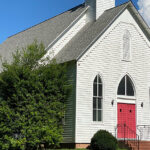
Fear is prevalent in our communities and even our churches. How can Christ-followers fight fear by resting in the goodness of God?
By Sarah E. Frazer
Fear was definitely a part of the scene. Imagine walking up to Mount Sinai during the time of the exodus. Moses, God’s chosen leader, and the people, stood before this great mountain enveloped with smoke and fire. There was thunder and lightning, and the earth shook. Above the sound of the thunder, a ram’s trumpet blast caused the people to shudder (Exodus 19:16-19).
We would have trembled in fear, and I’m sure those present felt that piece of fear in their hearts too. The noise, the sights, and the overall unknown must have created in their hearts a deep sense of panic. Who was this God? What was going to happen to them? Would they survive this encounter with the God who could turn water into blood? Questions about the future and about God are nothing new. Even now we ask these same questions.
Fear in the church
Over the years, pastors have seen members of their congregation move closer to fear rather than further from it. According to Lifeway’s Research, most U.S. Protestant pastors say they have witnessed a growing sense of fear in their congregations. Most pastors believe their congregations are fearful about the future of the nation and world.
After COVID, many Americans—Christian and non-Christian—do not feel safe or secure. According to another Lifeway Research study, Americans most want to avoid fear. None of us want to feel fearful, but we all do. Anxiety and fear, even among children, have risen over the past few years. How can pastors help their people combat fear and rest in God’s goodness?
Let’s go back to Exodus 19. After meeting with God on the mountain and receiving the law, Moses facilitates a covenant between the Israelites and God. Then he and Joshua go up to the mountain again. They are gone for 40 days, and during that time, the people despair. Plagued with fear, they build a golden calf and began to worship it (Exodus 32). Moses returns to the camp and mourns the people’s rebellion.
Overcome fear by meeting with God on a regular basis
In Exodus 33, Moses meets with God again outside the camp in a tent. In this passage we see the answer to how to rest in the goodness of God when plagued with fear. The first thing we see is that Moses met with God. Exodus 33:11 says, “The Lord would speak with Moses face to face, just as a man speaks with his friend, then Moses would return to the camp” (CSB). Seeing God as our friend allows us to get to know God deeper, taking comfort in His character.
“Seeing God as our friend allows us to get to know God deeper, taking comfort in His character.” — @sarah_e_frazer1 Click To TweetOvercome fear by seeking the presence of God
As we get to know God on a more intimate level, we can rest in His presence. God had told Moses in Exodus 33:2-3 that He would give them success, everything they wanted, but God Himself would not go with them. But Moses asks God to reconsider (Exodus 33:12-13). Moses knew something we also need to remember: The only way to face life—with all of its fears and anxieties—is with God’s presence.
As Christians, we have the promise of the Holy Spirit (John 15:26) and Jesus was God with us (Mathew 1:23). God’s presence has not left His church. The writer of Hebrews reminds us of God’s promise: “I will never leave you or abandon you” (Hebrews 13:5b, CSB). That promise is something we can rest in as we move into an unknown future. Like the children of Israel and like Moses, we do not know what is going to happen. We can’t see the path forward, but that’s OK.
“The only way to face life—with all of its fears and anxieties—is with God’s presence.” — @sarah_e_frazer1 Click To TweetOvercome fear by resting in God’s mercy, justice, and ultimately His control
The last thing Moses asks of God in Exodus 33 is profound when we think about walking with rest in our hearts. Moses asks God to show him His glory. God responds saying, “I will cause all my goodness to pass in front of you…” (Exodus 33:19a, CSB). All Moses had to do was rest. Moses didn’t have to search for God’s goodness. God’s goodness wasn’t something Moses had to earn as he and the people kept the law. We all think sometimes that we are responsible for finding God’s goodness. No, God’s goodness passed in front of Moses. It was going to be there—no work required.
What is God’s goodness? We find it in the rest of God’s answer. “I will be gracious to whom I will be gracious, and I will have compassion on whom I will have compassion” (Exodus 33:19b, CSB). In this one verse we see possibly the greatest tension in the Bible—God’s justice and God’s mercy.
Our human minds cannot figure how someone can be merciful and just all at once. This is where we see Jesus in Moses’s story. Jesus on the cross is the perfect picture of God’s justice and mercy. God caused His Son to suffer and die the death we deserved so we could experience the depths of God’s mercy.
Even as the world moves further and further away from God, Christians can rest in God’s character, His presence, and ultimately in God’s plan. You see, God would redeem the children of Israel. He had a plan. And even though they rebelled, God’s plan went forth. God has a plan for our lives as well. No government, sickness, or unrest will ever thwart God’s ultimate plan for His church. This is what we can rest in today.
For permission to republish this article, contact Marissa Postell Sullivan.












